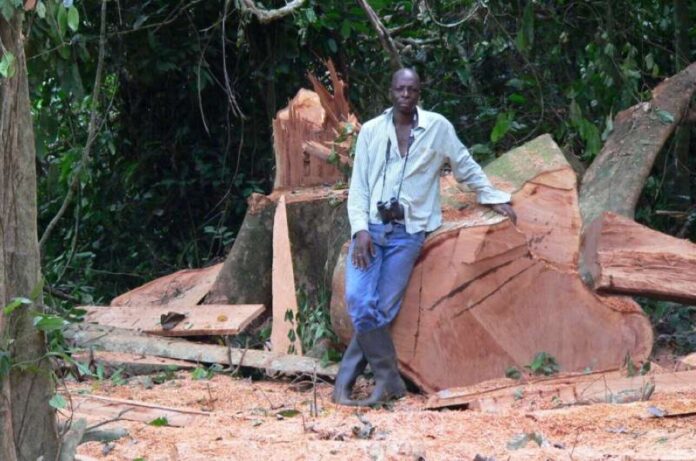The study, conducted by Nico Arcilla, sheds light on the perspectives of community members involved in community-based natural resource management (CBNRM) efforts in Ghana. The research emphasizes the urgency of reducing illegal logging, a major threat to forest conservation, biodiversity, and local economies. Illegal logging not only degrades critical habitats but also poses substantial challenges to sustainable development. Arcilla’s findings highlight both the successes and limitations of CBNRM initiatives, providing insight into the expectations and realities of local communities in these efforts.
Africa’s biodiversity, particularly its emblematic wildlife and unique ecosystems, is under severe threat due to rapid population growth, land use changes, and economic pressures. In West Africa, for example, natural areas once sparsely populated are being intensively developed, impacting both ecosystems and the communities dependent on them. In Ghana, widespread logging and mining operations, along with the expansion of cocoa plantations, have led to the extensive loss of Upper Guinea forests, a biodiversity hotspot of global importance. Today, more than 80% of these forests are gone, replaced by agricultural land and urban development. The consequences for wildlife are devastating, with mammal populations plummeting by over 85% in some areas, including within designated protected zones.
Despite the pressing need for conservation, West Africa’s conservation efforts have been marred by inadequate law enforcement, limited funding, and systemic challenges. Traditional protected areas alone are insufficient to preserve biodiversity, especially in regions with high human population density. This context has spurred interest in community-driven conservation approaches like CBNRM, which seeks to integrate local communities into conservation planning, management, and benefit-sharing. In Ghana, CBNRM has been implemented through Community Resource Management Areas (CREMAs) for over 20 years. CREMAs aim to manage resources sustainably, reducing emissions from deforestation and forest degradation under programs like REDD+.
To understand how communities perceive CREMA efforts, Arcilla and colleagues conducted interviews with 881 individuals across 89 communities around eight CREMA sites, including Mole National Park and Bia National Park. Interviews, conducted in local languages with native speakers, captured community members’ views on various conservation, economic, and sociocultural outcomes associated with CREMAs.
The study revealed that while participants acknowledged some benefits from CREMAs, such as increased conservation awareness, many felt that CREMA initiatives did not fully meet their expectations. Conservation awareness ranked as the highest-achieving outcome, while controlling illegal logging—a vital but challenging goal—ranked much lower, largely due to external dependencies like government enforcement. Illegal logging remains a persistent issue in Ghana, with an estimated 80% of timber harvested illegally, much of it used to meet domestic demand. The study found that community dissatisfaction with ongoing illegal logging reflects a widespread, systemic issue that impedes conservation and sustainable development efforts.
Interestingly, the study challenges the notion that CREMA participants view conservation purely as a means to economic ends. Instead, participants ranked conservation outcomes as more critical than economic benefits, demonstrating a broader community commitment to conservation objectives. Nevertheless, unmet expectations in areas like improved employment opportunities, financial support, and income generation were prevalent. For instance, while participants appreciated improved food production and alternative livelihoods like honey production, they were disappointed by a lack of job creation and income diversification. This suggests that while CREMAs may contribute to local conservation efforts, they are limited in their ability to drive substantial economic change without external support.
Sociocultural outcomes, such as collective community action and traditional knowledge preservation, were rated lower in importance but received relatively positive assessments. The most significant performance gap here related to children’s school attendance, which the study identified as an area requiring further community support and resources.
Overall, Arcilla’s research underscores that while CREMAs can promote conservation awareness and act as buffers to protected areas, they cannot independently achieve broader conservation goals. The success of CBNRM initiatives, like CREMAs, hinges on strong partnerships with government and organizations, dedicated law enforcement, and continued financial investment. To enhance the effectiveness of CREMAs, the study recommends allocating increased resources for capacity building in associated protected areas and involving community members directly as park rangers or extension agents. These efforts could address key economic gaps, such as employment and income generation, while empowering local communities in conservation efforts.
Future research could deepen understanding by collecting empirical data to evaluate wildlife and natural resource changes within CREMAs. By tracking conservation outcomes quantitatively, researchers and policymakers can gain valuable insights into the success of CBNRM initiatives, ensuring that these community-driven efforts contribute meaningfully to sustainable development and biodiversity preservation.
















 The African Research (AR) Index is a comprehensive scholarly directory and database focused explicitly on journal publishers that publish and disseminate African research.
The African Research (AR) Index is a comprehensive scholarly directory and database focused explicitly on journal publishers that publish and disseminate African research.

